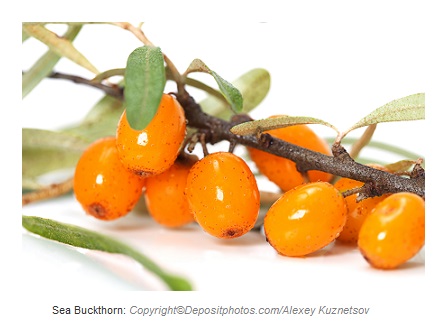Sea buckthorn is a thorny shrub in Europe and Asia, and its leaves, flowers,  seeds and fruits have been used to promote health for thousands of years. The Himalayan sea buckthorn berry is known as “beauty berry” across Europe and Asia. One cup of sea buckthorn provides 22 grams of carbohydrates, 7 grams of fat, 3 grams of fiber, and 2 grams of protein.
seeds and fruits have been used to promote health for thousands of years. The Himalayan sea buckthorn berry is known as “beauty berry” across Europe and Asia. One cup of sea buckthorn provides 22 grams of carbohydrates, 7 grams of fat, 3 grams of fiber, and 2 grams of protein.
Average calories: 158 per one cup
|
Sea Buckthorn: one cup |
|
|
Carbohydrate |
22 |
|
Fiber |
3 |
|
Protein |
2 |
|
Fat |
7 |
|
Calories |
158 |
Vitamins found in higher amounts: vitamins A, B1, B2, B9, C, and K. Vitamin C in sea buckthorn is 15 times higher than orange (700 mg vs 45 in 100 grams).
Minerals found in higher amounts: potassium, magnesium, and copper.
Phytonutrients found in higher amounts and their health benefits: sea buckthorn has been thoroughly researched in over 130 modern scientific studies and they have found that this berry promotes health. It contains over 190 bioactive compounds that support health.
Sea buckthorn is rich in carotenoids, beta-sitosterol, flavonoids and phenolic compounds. Because of the phytonutrients, sea buckthorn may have the following health benefits:
a) Provides powerful antioxidants.
b) Helps reduce inflammation.
c) Helps maintain normal cholesterol and platelet activity.
d) Supports a healthy digestive system.
e) Potential activity against cancer.
f) Skin health: sea buckthorn oil is used orally or topically as skin softener.
g) Used in diarrhea and skin disorders.
Sea buckthorn also contains Omega-3, Omega-6, Omega-7, and Omega-9 fatty acids.

